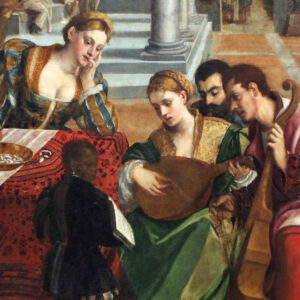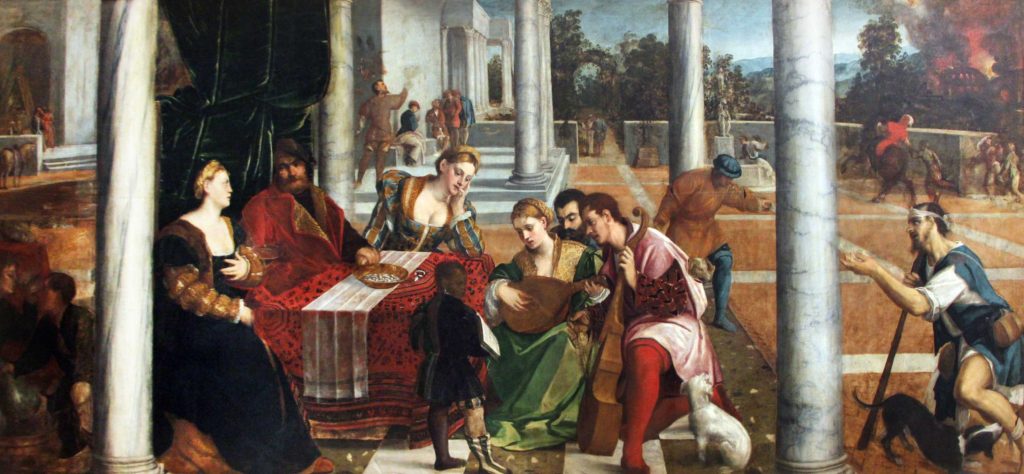Gaspara Stampa (1523-1554) translations from RIME (Rhymes)
The translations of Rhymes n. 1 and 7 and this article are © 2016 by Chris DiMatteo. Translations of n. 6, 72, 73 and 76 are © 2024 by Chris DiMatteo. All rights reserved.

Here are my English translations of six sonnets by Gaspara Stampa, the most renowned Italian woman poet of her time and one of the most skilled and interesting poets ever, regardless of gender. Her collection of 311 Rime (Rhymes) is an eloquent and deeply personal emotional autobiography. Her sister Cassandra published them in 1554 right after Gaspara’s untimely death at the age of 31.
She addresses other women directly in her writing: in Rime, number I, at line 9, “E spero ancor che debba dir qualcuna” (I hope some lady will see fit to say); in the first line of N. VII… “Chi vuol conoscer, donne, il mio signore” (Ladies, if you wish to know my lover) and in the first line of N. LXXXVI, “Piangete, donne, e con voi pianga Amore (Cry, ladies, and Amore cries with you). She also addressed other women directly in her life as a poet, musician and singer in the very lively city of Venice of the early to mid 1500s.
Gaspara Stampa as a Musician
Gaspara Stampa was famous for her music as well as her poetry, during her short life. She wrote and played songs but sadly only her reputation as a singer and lutenist has been preserved, and none of her music. In the painting below, I believe that is Gaspara Stampa depi ted in the middle playing the lute with her sister Cassandra at the table behind her. They sure look the part. Gaspara Stampa and the painter, Bonifazio de’Pitati, were contemporaries in Venice and she was well known as a musician.
I have searched the academic literature on poetry as well as art history and have found no evidence of anyone else identifying Gaspara Stampa here in this painting. A poor reproduction of a detail of Gaspara is on the cover of the BUR paperback edition of her works, with the name of the painting listed, but there is no mention of her otherwise, in the edition’s critical notes or on the cover. I first published this idea here in October 2016 and to this date have not found any reference to this in previous writing on the subject, apart from the ambiguous BUR cover.

“Il convitto del ricco epulone” by Bonifazio de’Pitati, a.k.a. Bonifazio Veronese, in the Gallerie dell’Accademia in Venice. The title means “The Banquet of the Wealthy Epulone” and depicts the biblical story of the rich man and Lazarus.
Gaspara Stampa Sings the Blues
Garpara Stampa could be considered the Taylor Swift of the sixteenth century, as an independent woman poet and musician who wrote poems about her sentimental life which she set to music. Gaspara also anticipated the blues, four centuries before Ma Rainey, Bessie Smith and Billie Holiday sang the same kind of songs. She and these twentieth and twenty-first century ladies are singing the same song. Gaspara Stampa was singing the blues, four hundred years before they were ever heard. For just one example, compare Gaspara’s laments to the lyrics that Billie Holiday wrote for her song “Fine and Mellow,” a blues song where she also wrote the music:
My man don’t love me, treats me oh so mean,
My man don’t love me, treats me awful mean,
He’s the meanest man, that I’ve ever seen. (etc.)
My translations of Rime (Rhymes) N. 1, 6, 7, 72, 73 & 76:
Gaspara Stampa, Rime, n. I – n. 1
O you who hear these melancholy rhymes
my dismal, sad and blue accented gloom,
the sound of these my amorous laments,
and o my woes the greatest of these all,
Wherever t’is that valor is most prized
Glory, also pity for my pain,
I hope to hear from you, my well-born friends,
That I lament for reasons so sublime.
I hope some lady will see fit to say
-You happy woman that you can hold up
against such woes and with such clear intent!
Well, I would wish that fortune, such a love,
for such a noble lord, would come to me,
that even I, that way, could be her peer.
Original text of n. 1
Voi, ch’ascoltate in queste meste rime
in questi mesti, in questi oscuri accenti
il suon degli amorosi miei lamenti
e de le pene mie tra l’altre prime,
ove fia che valor apprezzi e stime,
gloria, non che perdon, de’ miei lamenti
spero trovar fra le ben nate genti,
poi che la lor cagione è sì sublime
E spero ancor che debba dir qualcuna:
-Felicissima lei, da che sostenne
per sì chiara cagio danno ì chiaro!
Deh, perché tant’amor, tanta fortuna
per sì nobil signor a me non venne,
ch’anch’io n’andrei con tanta donna a paro?
Gaspara Stampa, Rime, n. VI – n. 6
An intellect angelic and divine,
The nature and the bearing of a king,
A quiet sense, for fame and honor yearns,
And elegantly wise and grave in speech.
Illustrious your kingly heritage,
a fortune second only to a few,
so vivid in the flower of your youth,
Dec’rous, sweet and modest in your manners.
A visage shining brighter than the sun
Amore is at home, where charm and grace
were never seen before in such a man,
Heavy are the chains that keep me captive
Waging war in honor and in sweetness,
May it please Amor to ever hold me.
Original Text n. 6
Un intelletto angelico e divino,
Una real natura et un valore,
Un disio vago di fama e d’onore,
Un parlar saggio, grave e pellegrino,
un sangue illustre, agli alti re vicino,
una fortuna a poche altre minore,
un’età nel suo proprio e vero fiore,
un atto onesto, Mansueto e chino,
un viso più che ’l sol lucent e chiaro,
ove bellezza e grazia Amor riserra
in non mai più vedute o udite tempre,
fûr le catene, che già mi legâro,
e mi fan dolce ed onorata guerra.
O pur piaccia ad Amor che stringan sempre!
Gaspara Stampa – Rime n. VII – n. 7
Ladies, if you wish to know my lover,
Imagine someone strong and sweet to see,
Young in years and yet of wisdom older,
His glory and his valor there for me,
A fair-haired youth of lively colored gaze,
And standing tall and broadly in his chest,
For me a perfect man in many ways
who sadly, can return no love to me.
And if you will know me, I’ll have you see
a woman in effect who carries all
the image of my martyrdom and death
A sanctuary of my constant faith
And so although I cry and burn and sigh,
No pity does my cruel lover feel.
Original text of N. 7:
Chi vuol conoscer, donne, il mio signore,
miri un signor di vago e dolce aspetto,
giovane d’anni e vecchio d’intelletto,
imagin di la gloria e del valore;
di pelo biondo, e di vivo colore,
di persona alta e spazioso petto,
e finalmente in ogni opra perfetto,
fuor ch’un poco (oimè lassa!) empio in amore.
E chi vuol poi conoscer me, rimiri
una donna ineffetti ed in sembiante
imagin de la morte e de’ martiri,
un albergo di fé salda e costante,
una, che, perché pianga, arda e sospiri,
non fa pietoso il suo crudel amante.
Gaspara Stampa – Rime n. LXXII – n. 72
My life a sea is, watered by my tears.
The winds that blow, my sighs; my ship is hope
and my desires are the sails and oars
that catch the wind and push and drive it so.
My compass is your sacred glowing light
that shines before me, eyes like brilliant stars.
And I should steer my ship there from afar,
Without a rudder nor a pilot’s cries.
The dangers, storms and tempests I endure
are all of dreaded frigid jealousy
that quickly rise and only slowly fade.
There are no friendly winds, because the day
that you, my Conte, turned away from me,
With you, I lost my own serenity.
Original text n. 72
La mia vita è un mar: l’acqua è ’l mio pianto,
i venti sono l’aure de’ sospiri,
la speranza è la nave, i miei desiri
la vela e i remi, che la caccian tanto.
La tramontana mia è il lume santo
de’ miei duoo chiari, due stellanti giri,
a’ quai convien ch’ancor lontana i’ miri
senza timon, senza nocchier a canto.
Le perigliose e sùbite tempeste
son le teme e le fredde gelosie,
al dipartirsi tarde, al venir preste.
Bonacce non vi son, perché dal die
che voi, conte, da me lontan vi feste,
partîr con voi l’ore serene mie.
Gaspara Stampa – Rime n. LXXIII – n. 73
If I could know that even just for once,
that you could muster lofty thoughts for me,
My sighs of love, which leave me all alone,
Might someday give me just a bit of rest.
Yet heaven, to my sorry detriment,
has left my soul untethered and bereft,
The bitter pain has settled in my heart
Since Cupid has no pity for his prey.
And as I feel and suffer, full of faith,
Yet never any pity do you feel
Contented as you are to see my pain.
Alas my yearning hope is dashed again
If God will not provide relief for me
My restless soul demands to be released.
Original text n. 73
Deh foss’io certa almen ch’alcuna volta
voi rivolgeste a me l’alto pensiero,
conte, a cui per mio danno i cieli diêro
sì da’ lacci d’Amor l’anima sciolta,
L’acerba pena mia nel petto accolta,
l’empia mercé del dispietato arciero,
i sospir, che ’n amor sola mi fêro,
avrian triegua talor o poca o molta.
Ma ’l sentirmi patir carca di fede,
senza muover pietade a che mi strugge,
a chi contento i miei tormenti vede
sì le speranze mie tronca et adugge
che, se Dio rimedio non provede,
l’alma per dipartirsi freme e rugge.
Gaspara Stampa Rime n. LXXVI – 76
The times Amore has me in his aim,
desire and absence come to me at war.
And I would bury each one in the earth,
to flee their hunt of darkness and of death.
I only seek the guidance of your gaze
however far away, its virtue shines
so as to guide my doubtful, errant ship
along the shore and safely into port.
So much as I have had to suffer love
As much again has love uplifted me
As if a hand could hold and free at once.
O bitter joy, oh sweet torment of mine,
May heaven never take away from me
what makes me now unhappy, then content.
Original text n. 76
Quando talor Amor m’assal più forte,
e ’l desir e l’assenzias mi fan guerra,
e questa e quell vorria pormi sotterra,
preda d’oscura e dispietata morte.
Io mi rivolgo a le mie fide scorte,
onde, benché lontan, virtù si sferra
tal che la nave mia, che dubbiosa erra,
subito par ch’al lido si riporte.
sì che quanto ho d’Amor onde mi doglia,
tanto ho onde mi lodi, poi ch’io sento
ch’una sol man mi leghi, una mi scioglia.
O gioia amara, o mio dolce tormento,
io prego il ciel che mai non mi vi toglia,
e sia ’l mio stato or misero, or contento.

Raffaello Sanzio, Madonna Sistina, Vatican Museum (detail from the bottom of the painting).
